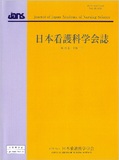Japanese
English
- 販売していません
- Abstract 文献概要
- 参考文献 Reference
要旨
目的:NICU入院児の母親の直接授乳開始(直母)後1か月の母乳育児自己効力感(BSE)の関連要因を明らかにした.
方法:縦断的観察研究.直母後3〜7日と1か月に自記式質問紙調査を行い,直母後1か月のBSEの関連,予測要因を重回帰分析にて検討した.
結果:対象はNICU入院児の母親97名であった.関連要因は,年齢(偏回帰係数:B = -.34,p = .048),初産婦(B = -4.56, p = .005),母乳不足感(B = 1.63, p < .001),ストレス対処能力(B = .33, p = .029)であった.予測要因は,直母後3〜7日の母乳不足感(B = 1.19, p < .001)とストレス対処能力(B = .75, p < .001)であった.
結論:NICU入院児の母親の直母後1か月のBSEの予測要因は3〜7日の母乳不足感とストレス対処能力であった.
Objective: This study aimed to evaluate the breastfeeding self-efficacy (BSE) of mothers with infants in the neonatal intensive care unit (NICU) beyond one month from starting breastfeeding, and to identify factors associated with BSE.
Method: This was a longitudinal observational study. Using self-reported questionnaires, BSE and potentially relevant factors of mothers with infants in the NICU were measured at two time points: 3-7 days and one month after starting breastfeeding. We analyzed the relevant factors with models: cross-sectional association and prediction of BSE at the second time point; using multivariable regression analysis.
Results: A total of 97 mothers were included in this analysis. The factors that affect BSE beyond one month after starting breastfeeding were the mother's age (partial regression coefficient: B = -.34, p = .048), primipara (B = -4.56, p = .005), perception of insufficient milk (PIM; B = 1.63, p < .001) and sense of coherence (SOC; B = .33, p = .029). The factors predicting BSE were PIM (B = 1.19, p < .001) and SOC (B = .75, p < .001) at 3-7 days after starting breastfeeding.
Conclusion: This study found that PIM and SOC predicted BSE of mothers with infants in the NICU between 3-7 days and one month after starting breastfeeding.
Copyright © 2020, Japan Academy of Nursing Science. All rights reserved.


